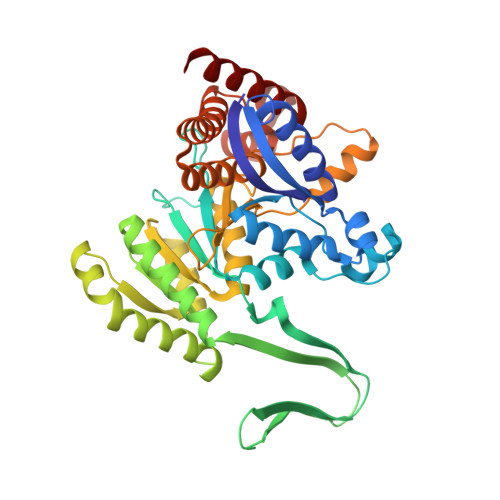NADP+-dependent cytosolic isocitrate dehydrogenase provides NADPH in the presence of cadmium due to the moderate chelating effect of glutathione.
Cho, H.J., Cho, H.Y., Park, J.W., Kwon, O.S., Lee, H.S., Huh, T.L., Kang, B.S.(2018) J Biol Inorg Chem 23: 849-860
- PubMed: 29923039
- DOI: https://doi.org/10.1007/s00775-018-1581-5
- Primary Citation of Related Structures:
5YZH, 5YZI - PubMed Abstract:
Cadmium (Cd 2+ ) is toxic to living organisms because it causes the malfunction of essential proteins and induces oxidative stress. NADP + -dependent cytosolic isocitrate dehydrogenase (IDH) provides reducing energy to counteract oxidative stress via oxidative decarboxylation of isocitrate. Intriguingly, the effects of Cd 2+ on the activity of IDH are both positive and negative, and to understand the molecular basis, we determined the crystal structure of NADP + -dependent cytosolic IDH in the presence of Cd 2+ . The structure includes two Cd 2+ ions, one coordinated by active site residues and another near a cysteine residue. Cd 2+ presumably inactivates IDH due to its high affinity for thiols, leading to a covalent enzyme modification. However, Cd 2+ also activates IDH by providing a divalent cation required for catalytic activity. Inactivation of IDH by Cd 2+ is less effective when the enzyme is activated with Cd 2+ than Mg 2+ . Although reducing agents cannot restore activity following inactivation by Cd 2+ , they can maintain IDH activity by chelating Cd 2+ . Glutathione, a cellular sulphydryl reductant, has a moderate affinity for Cd 2+ , allowing IDH to be activated with residual Cd 2+ , unlike dithiothreitol, which has a much higher affinity. In the presence of Cd 2+ -consuming cellular antioxidants, cells must continually supply reductants to protect against oxidative stress. The ability of IDH to utilise Cd 2+ to generate NADPH could allow cells to protect themselves against Cd 2+ .
- School of Life Science and Biotechnology, BK21 Plus KNU Creative BioResearch Group, Kyungpook National University, 80 Daehak-ro, Buk-gu, Daegu, 41566, South Korea.
Organizational Affiliation:


















